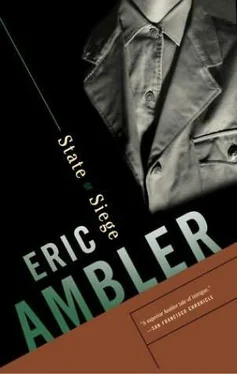Eric Ambler - State of Siege
Здесь есть возможность читать онлайн «Eric Ambler - State of Siege» весь текст электронной книги совершенно бесплатно (целиком полную версию без сокращений). В некоторых случаях можно слушать аудио, скачать через торрент в формате fb2 и присутствует краткое содержание. Год выпуска: 1956, ISBN: 1956, Издательство: Berkley, Жанр: Криминальный детектив, на английском языке. Описание произведения, (предисловие) а так же отзывы посетителей доступны на портале библиотеки ЛибКат.
- Название:State of Siege
- Автор:
- Издательство:Berkley
- Жанр:
- Год:1956
- ISBN:9780425067680
- Рейтинг книги:3 / 5. Голосов: 1
-
Избранное:Добавить в избранное
- Отзывы:
-
Ваша оценка:
- 60
- 1
- 2
- 3
- 4
- 5
State of Siege: краткое содержание, описание и аннотация
Предлагаем к чтению аннотацию, описание, краткое содержание или предисловие (зависит от того, что написал сам автор книги «State of Siege»). Если вы не нашли необходимую информацию о книге — напишите в комментариях, мы постараемся отыскать её.
State of Siege — читать онлайн бесплатно полную книгу (весь текст) целиком
Ниже представлен текст книги, разбитый по страницам. Система сохранения места последней прочитанной страницы, позволяет с удобством читать онлайн бесплатно книгу «State of Siege», без необходимости каждый раз заново искать на чём Вы остановились. Поставьте закладку, и сможете в любой момент перейти на страницу, на которой закончили чтение.
Интервал:
Закладка:
I felt sure that he did know.
The sky lightened, and then the sun rose.
We went to the window again.
A pall of smoke hung over the area where the barracks were. The destroyer had ceased firing and was lying there innocently on the smooth, sparkling surface of the bay. There were some bursts of light automatic fire and one or two faint thuds that might have been two-pounders in action. The radio in the next room had been switched on. The station was transmitting a recording of Sanusi’s “foreign policy” speech of the previous night, translated into Hindustani. I realised that the station had probably been transmitting in various languages all through the night, and wondered vaguely what sort of output Osman was getting from the generator. Down in the square there was a sound of trucks being started and driven off.
“I am hungry,” Rosalie said.
“So am I.”
We divided the cold rice between us and then ate some fruit. While we were eating, the destroyer’s guns opened up again, but this time we took no notice. I thought that I could imagine what was going on. In the darkness their shooting had not been too good. As a result, when the tanks and infantry had moved in, they had met with more opposition than they had expected. The guns had been called upon to put down some properly observed fire before the attack was resumed. I told Rosalie this fiction as if it were fact.
She said: “How do you know?”
“That is how these things happen. Soon, the General will issue a communiqué. He will say that an enemy attack on the outer defence ring was beaten off with heavy losses to the enemy and at practically no cost to the defence. But he will also announce a tactical withdrawal to previously prepared positions of greater strength, in order to straighten the line.”
“What does that mean?”
“It is the language of retreat. We shall be having plenty of it soon, I think …”
We both heard the planes at the same moment. As we dived for the floor, one of the men on the terrace began shouting orders to the machine-gunners on the roof. I started to drag the rug over our heads and then, remembering that there was no glass left to worry about now, dropped the rug and pulled the curtains aside.
“There,” said Rosalie.
I saw them then. They were the three planes which had bombed us the previous day, but now they were flying at over six thousand feet. There was a noise like a pneumatic drill over our heads as the machine guns on the roof opened fire, and a few more bits of plaster fell from the ceiling. They had one of the things mounted almost directly above us. As the gunner traversed, a shower of ejected cartridge cases came tinkling down on to the terrace. The gunners must have known that, at that range, they could not have hit a house, but they went on firing just the same.
Something began dropping from the planes. It looked for a moment like a load of incendiaries. Then, the black dots in the sky seemed to split up and stop falling, and I realised that it was leaflets that were being dropped. The men in the next room realised it at the same moment and ran out on to the terrace, staring up and exclaiming excitedly.
The Sundanese Air Force may not have been very good at hitting its targets with bombs, but with leaflets it was superbly accurate. A minute after the drop, the sky above the Van Riebeeck Square was filled with them, evenly distributed and fluttering down in perfect formation. Suddenly, the men on the terrace began running about wildly, capering up and down, snatching at the air as the first of the leaflets came within reach. It was a fantastic spectacle. Two of them, intent on the same leaflet, cannoned into one another as the paper swooped capriciously over the edge of the balustrade. There were shrill cries of protest, and Rosalie began to giggle uncontrollably.
We were still on the floor and she hastily crawled away to the bed to smother her laughter. I stayed by the window, and, some seconds later, about a dozen leaflets fell on the terrace. One was within a yard of me and, when I saw that the men were not picking all of them up, I reached out and got it.
The same message was printed on both sides in Malay and English. Rosalie had recovered now and I took it over to show her.
It was not long. It was addressed: “To All Loyal Citizens of The Republic of Sunda.” It said:
“During the past thirty-six hours, a terrorist criminal organisation calling itself the People’s National Freedom Party, and led by a former officer named Kamarudin b. Sanusi, has taken advantage of the absence of the Republican Army on manoeuvres to occupy certain public buildings in Selampang and other towns in the Southern Provinces, including newspaper offices and premises used by Radio Sunda. Statements put out by the terrorists, both by radio and in certain newspapers, indicate that it is their intention to attempt, in contravention of the provisions of the Constitution of the Republic, to overthrow the elected Government of the Republic by force. By my lawful authority as President of the Republic, a State of Emergency has, therefore, been stated to exist, and the said Kamarudin b. Sanusi and his associates are declared to be enemies of the Republic.
“Under the Public Security Law of 1948, any person giving aid to a declared enemy of the Republic or permitting such aid to be given by others, may be punished by death. The Army of the Republic will now proceed to administer justice. The innocent, who have nothing to fear, will welcome their defenders. It is likely, too, that there are some persons who now regret their part in the disorders that have taken place. Providing that they surrender immediately to the advancing troops and give them all assistance, such persons will be treated leniently. This applies also to members of the so-called T.K.R., or People’s Army of Security. Failure to obey promptly all orders issued by, or in the name of, the Officer Commanding the Army of the Republic, General Ishak, will be an offence punishable by death. We fight for Freedom and the Constitution.”
There followed the printed signature of President Nasjah and the date. The ink smudged off on my fingers. Presumably, they had been printed in Meja during the past twelve hours; but someone had had the forethought to have stereos of the signature ready in advance. In dealing with its enemies, at least, the Government could be efficient.
I remarked on the fact to Rosalie. She shrugged.
“No doubt there are others like Major Suparto. It is said this swine Ishak is intelligent. What do you think that they will do to us before they kill us?” It was said quite evenly, but there was something in the tone of her voice that should have warned me to be careful. It did not, however; I was re-reading the leaflet.
“To us?” I said vaguely.
“Of course. It says that we are criminals now.”
“What do you mean?”
She pointed to the leaflet. “You have helped them with the radio. I am with you. We have taken part. We shall not be able to surrender. Perhaps it will be better if we are killed here.”
“Let’s hope we won’t be killed at all.”
“Hope? That is amusing, I think.”
“There’s not much else we can do.”
“We can kill ourselves.”
Two minutes earlier she had been laughing because some men were jumping about, making fools of themselves. The change was so fantastic that I smiled. The smile was a mistake.
“Are you afraid?” Suddenly, she was breathing quickly and her eyes were gleaming with hatred. “It would be quite simple. We could jump from the terrace. It would be quick and not painful. But if you are afraid, I will do it myself.”
She started up and I gripped her arm. “Rosalie, listen to me.”
“What does it matter if a filthy Indo dies?” Then, she broke into Dutch and I could not understand much of what she said.
Читать дальшеИнтервал:
Закладка:
Похожие книги на «State of Siege»
Представляем Вашему вниманию похожие книги на «State of Siege» списком для выбора. Мы отобрали схожую по названию и смыслу литературу в надежде предоставить читателям больше вариантов отыскать новые, интересные, ещё непрочитанные произведения.
Обсуждение, отзывы о книге «State of Siege» и просто собственные мнения читателей. Оставьте ваши комментарии, напишите, что Вы думаете о произведении, его смысле или главных героях. Укажите что конкретно понравилось, а что нет, и почему Вы так считаете.












